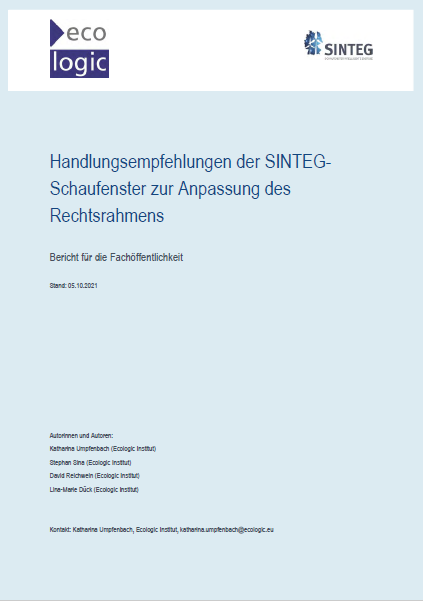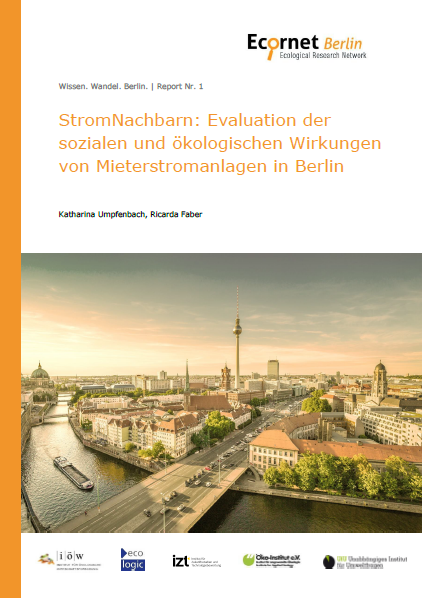Handlungsempfehlungen der SINTEG-Schaufenster zur Anpassung des Rechtsrahmens
Bericht für die Fachöffentlichkeit
- Publication
- Citation
Umpfenbach, Katharina; Stephan Sina; David Reichwein; Lina-Marie Dück 2021: Handlungsempfehlungen der SINTEG-Schaufenster zur Anpassung des Rechtsrahmens. Bericht für die Fachöffentlichkeit. Berlin: Ecologic Institute.
In the "Smart Energy Showcase" programme (SINTEG), more than 300 research institutes and companies in five model regions developed solutions for a future energy system that will be entirely based on renewable energies. The participants not only developed new technologies, processes and market mechanisms, they also proposed changes to the legal framework that would allow those solutions to be scaled up. Commissioned by the Federal Ministry for Economics and Energy that initiated SINTEG, Ecologic Institute just published a systematic overview of the issues addressed in these proposals for regulatory change. Moreover, the report discusses the proposals in the context of the ongoing national energy policy debate.
The report is based on a systematic evaluation of the publications by SINTEG participants. It is intended to serve as an orientation for the interested public. Since the proposals address a wide range of very complex individual topics and differ greatly in their level of detail, this report cannot be a surrogate for the individual publications of course. Rather, the aim is to make it easier for all interested parties to get an impression of the proposals' content and to enable quick identification of those publications that are most relevant for the reader’s area of interest.
Thematic priorities of regulatory changes proposed in SINTEG
The main issue addressed in the SINTEG publications is the provision of flexibility for the market and for the grid – focusing in particular on flexibility platforms as a market-based instrument in congestion management. In addition, the SINTEG participants also developed proposals on the framework for smart meters and control technologies, as well as on enabling digitization in electricity grid operation. In addition, there are individual suggestions for the further development of experimentation clauses, which build on the experience with the SINTEG ordinance – a temporary regulatory sandbox scheme that was put in place specifically for SINTEG participants. Finally, the researchers developed a set of proposals for local marketing of renewable electricity as a tool to increase acceptance of the energy transition.
When comparing the SINTEG proposals with the national energy policy debate, it becomes clear that the publications take up many questions that are prominent in the general debate as they are central challenges of energy market regulation. This applies, for example, to options for reforming the grid fee system, to the demand for restructuring charges, levies and taxes that make up a large share of electricity prices in Germany, or to the rules governing how grid operators’ investment and operating costs are accounted for when regulators decide on grid fees. A great added value of the SINTEG results consists in the fact that the perspective of the distribution grids took centre stage in the research process and that grid operators were directly involved. Moreover, research focused on the potential of and the challenges facing decentralised energy plants that have to provide new system services in an energy system based entirely on renewable energies.
First testing of market-based flexibility platforms
In SINTEG, participants tested market-based flexibility mechanisms to address congestion in the power grid under real conditions and at large scale for the first time. This is a unique feature of the programme. The insights gained and the proposals for regulatory adjustments that build on these insights are an important contribution to the ongoing debate on how flexibility can be stimulated on the supply side and, more importantly, on the demand as well.






